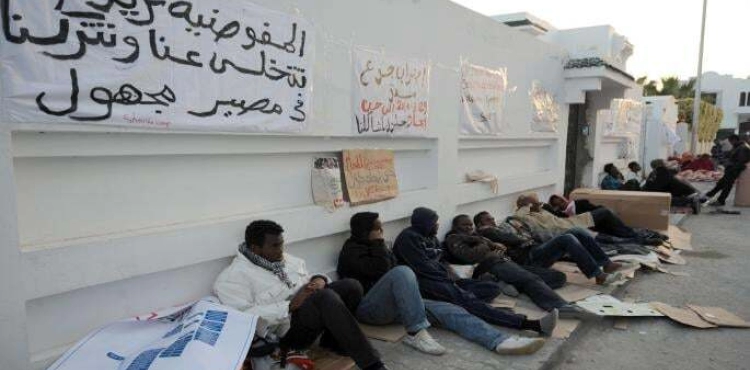"We have nowhere to go, no water or food," says the pregnant Yemeni woman, "Nasra," and her seven children stood by her side. She is like 100 other asylum seekers who stand every day in front of the headquarters of the International Organization for Migration in Tunisia, hoping for a solution to their crisis .
Nasra Mohamed (27 years old) lives with her husband and their seven children in a tent that they set up with the help of volunteers in front of the headquarters of the United Nations High Commissioner for Refugees in the Beheira region of the Tunisian capital.
Nasra´s case is similar to the case of other refugees coming from about fifteen countries, most of them from sub-Saharan countries, who are asking the United Nations High Commissioner for Refugees to evacuate them from Tunisia "to a safe country."
On Tuesday, they were dispersed during a strong intervention by the police forces using tear gas, and some of their tents were dismantled by a team from the municipality.
Dozens of them were arrested and arrested, according to the Tunisian Ministry of Interior on Tuesday.
Recently, the conditions of asylum seekers awaiting regularization in Tunisia have deteriorated, especially following a speech described as "hate" by President Kais Saied on February 21, in which he criticized illegal immigration and the large presence of migrants from sub-Saharan countries in the country.
Saied denounced what he saw as the arrival of "hordes of immigrants" from sub-Saharan African countries as part of a plot to "change the demographic composition" of his country, which led to a campaign against immigrants residing illegally in the country.
As a result of these statements, hundreds of immigrants found themselves in front of their country´s embassies, demanding their deportation.
A large number of them have been returned to their countries, particularly to Côte d´Ivoire, Senegal, Guinea and Mali.
On the other hand, others continued their attempts to cross the Mediterranean in illegal immigration operations towards the European coasts, which sometimes ended in drowning accidents, and dozens of them died.
Unlike migrants, asylum seekers cannot go to their embassies and ask for help because they have fled countries facing wars, famines and humanitarian catastrophes, or they are threatened with reprisals and are supposed to benefit from UNHCR protection.
Agence France-Presse asked the Commission on Wednesday for an explanation regarding the nature of the rights enjoyed by asylum seekers , but it did not respond.
The UN organization in Tunisia confirmed on its Facebook page its "deep rejection of the violence" that took place on Tuesday in front of its headquarters.
And the United Nations High Commissioner for Refugees stated that "a small group of 200 refugees, asylum seekers and immigrants" staged a sit-in for three weeks in front of its headquarters, "interfered by force and caused material damage," which prompted it to call the police for urgent intervention.
In its statement, in which it called for "dialogue" to find "solutions", the organization affirmed its "commitment to continue providing protection and vital assistance to the displaced in Tunisia."
Nasra and her family left war-torn Yemen in 2020 and arrived in Tunisia in April 2022 after crossing many countries such as Sudan, Ethiopia, Niger, Algeria and then Libya.
"We ask European countries to intervene... We don´t want to stay in Tunisia. We will be buried here," Nasra told AFP.
Omar Khaled Ismail, a 17-year-old Sudanese with an asylum seeker card, has worked since his arrival in November 2022 in Tunisia and was staying with his employer, but after the president´s speech, he found himself on the street, fired from his job.
He says, "I have no home or a place to go to, and I came to the Commission, and they told me that they had assigned a lawyer to negotiate with the authorities and find a solution."
In contrast, Ammar (19 years old), another asylum seeker who fled the war in Central Africa at the age of nine, smiles and arrived in Tunisia in 2021 after living in a refugee camp in Chad.
Ammar also hopes that the UNHCR will find a solution for him. "We are refugees and we want to be sent to another country where we can be respected and appreciated, where we can live and go shopping without being attacked or humiliated," he says.
Asylum seekers in Tunisia are looking for a way out of an increasingly deteriorating situation












